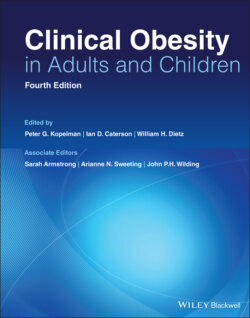Читать книгу Clinical Obesity in Adults and Children - Группа авторов - Страница 84
Prohormone convertase 1 deficiency
ОглавлениеFurther evidence for the role of the melanocortin system in the regulation of body weight in humans comes from the description of three patients with severe childhood obesity, abnormal glucose homeostasis, very low plasma insulin but elevated levels of proinsulin, hypogonadotropic hypogonadism and hypocortisolemia associated with elevated levels of POMC (Table 4.2). These subjects were found to be compound heterozygote/homozygous for mutations in prohormone convertase 1, which cleaves prohormones at pairs of basic amino acids, leaving C‐terminal basic residues, which are then excised by carboxypeptidase E (CPE) [43]. Although failure to cleave POMC is a likely mechanism for the obesity in these patients, prohormone convertase 1 (PC1) cleaves a number of other neuropeptides in the hypothalamus, such as glucagon‐like peptide 1, which may influence feeding behavior. Intriguingly, the second patient suffered from severe small intestinal absorptive dysfunction as well as the characteristic severe early‐onset obesity, impaired prohormone processing, and hypocortisolemia. We hypothesized that the small intestinal dysfunction seen in this patient, and to a lesser extent in the first patient we described, maybe the result of a failure of maturation of propeptides within the enteroendocrine cells and nerves that express PC1 throughout the gut.
Figure 4.1 Clinical response to leptin therapy in congenital leptin deficiency.
